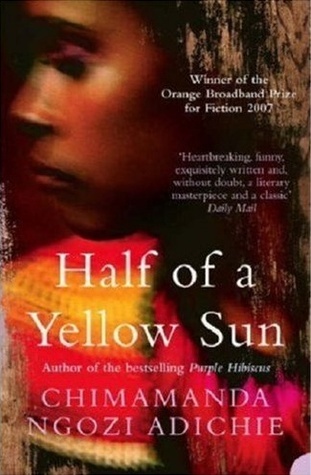 This is the second novel I have read by Chimamanda Ngozi Adichie, and it is equally as good as Americanah which I read almost a year ago. Half of a Yellow Sun is named after a detail in the flag of the short-lived Biafran nation; the novel is based in a period of political uncertainty during which Nigeria and the secessionist Republic of Biafra engaged in a war, and millions of people died due to starvation. (This is yet another novel that proves my ignorance of certain periods of history).
This is the second novel I have read by Chimamanda Ngozi Adichie, and it is equally as good as Americanah which I read almost a year ago. Half of a Yellow Sun is named after a detail in the flag of the short-lived Biafran nation; the novel is based in a period of political uncertainty during which Nigeria and the secessionist Republic of Biafra engaged in a war, and millions of people died due to starvation. (This is yet another novel that proves my ignorance of certain periods of history).
The novel follows three main characters; Ugwu, a young village boy who works for a university Professor names Odenigbo, Olanna, the girlfriend (and later wife) of Odenigbo, and Richard, an English writer who later becomes Kainene’s lover (Olanna’s twin sister). These three characters lives all become intertwined, yet each show a different view of the war. Ugwu develops intellectually throughout the novel, in my eyes being symbolic of Nigeria as a youthful nation, in a way he finds his feet and matures in a similar way to the Nigeria that Adichie portrays. Olanna seems to represent the idea of intellect over practicality, she is shown to be very intelligent but not very practical in comparison to her twin sister. Lastly Richard represents the lingering colonialism, he hopes to immerse himself in Nigerian/Biafran culture but never truly can and is only effective in his writing when he writes for the Western press about the war.
Although the war is the key theme of this novel, there are numerous other themes, including family relationships, politics and female empowerment. We see strained relationships between Olanna and her parents, Odenigbo and his mother, and Ugwu rarely seeing his family due to his work for the two of them. Throughout the novel we see Odenigbo and Olanna hosting social gatherings, at which the politics of both Nigeria and Africa in general are discussed. The reader also sees the development of female empowerment, both Olanna and Kainene live with men when unmarried. Kainene seems to be more powerful than Richard, having more influence on society. Olanna is told by her mother at one point, ‘You must never behave as if your life belongs to a man’, one of the more feminist comments in the novel.
This novel is amazing, it is powerful and it is informative. Adichie writes in such a way you can feel the heat of the country, the tension of the pre-war years, and the desperation when the Biafra nation is starving. I would thoroughly recommend this novel to anyone who enjoys good writing.